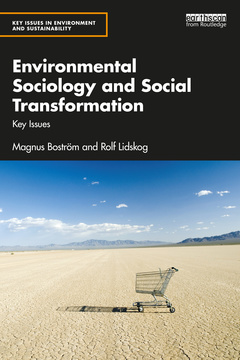Description
Environmental Sociology and Social Transformation
Key Issues
Key Issues in Environment and Sustainability Series
Authors: Boström Magnus, Lidskog Rolf
Language: English
Subjects for Environmental Sociology and Social Transformation:
· 15.6x23.4 cm · Paperback
Description
/li>Contents
/li>Readership
/li>Biography
/li>
Environmental Sociology and Social Transformation demonstrates how sociological theory and research are critical for understanding the social drivers of global environmental destruction and the conditions for transformative change.
Written by two professors of sociology who are deeply involved in the international community of environmental sociology, Magnus Boström and Rolf Lidskog argue that we need to better understand society as well as the fundamentally social nature of environmental problems and how they can be addressed. The authors provide answers to why so many unsustainable practices are maintained and supported by institutions and actors despite widespread knowledge of their negative consequences. Employing a pluralistic sociological approach to the study of social transformations, the book is divided into five key themes: Causes, Distributions, Understandings, Barriers, and Transformation. Overall, the book offers an integrative and comprehensive understanding of the social dimension of (un)sustainability, societal inertia, and conditions for transformative change. It provides the reader with references from classic and contemporary sociology and uses pedagogical features including boxes and questions for discussion to help embed learning.
Arguing that a broad and deep social transformation is needed to avoid a global civilization crisis, Environmental Sociology and Social Transformation will be a great resource for students and scholars who are exploring current environmental challenges and the societal conditions for meeting them.
Chapter 1. Crisis: The need for social transformation
The five facets of the social
Are we facing a civilizational crisis?
Social transformation
The five thematic issues of the book
References
Chapter 2. Causes: The social roots of environmental problems
Macrosocial explanations: What has caused the current environmental situation?
Microsocial explanations: Why don’t we live in an ecologically sustainable way?
Meso-social explanations
A question of power
Conclusion
Questions for reflection and discussion
References
Chapter 3. Distributions: The social spread of environmental problems
Social stratification: Class, gender, ethnicity
Environmental (in)justice
How inequality causes environmental problems and prevents action
Conclusion
References
Chapter 4. Understandings: The social sense-making of environmental problems
From fact-finding to sense-making
Storylines and frames: Making environmental issues meaningful
Claims and counterclaims in environmental storylines and politics
Conclusion
References
Chapter 5. Barriers: Social resistance through inadequate solutions
Barriers to transformation
Piecemeal solutions and the problem-solving mindset
Ten critical questions to reveal inadequate solutions
Conclusion
References
Chapter 6. Transformation: Ways of changing society
What does transformation mean?
Social transformation and the five facets of the social
A final word
References
Magnus Boström is Professor of Sociology at Örebro University, Sweden, with expertise in environmental sociology and the sociology of consumption. His current research focuses on the social drivers behind unsustainable mass consumption, as well as the conditions for lifestyle change and more collective ways of sharing resources.
Rolf Lidskog is Professor of Sociology at Örebro University, Sweden, with expertise in environmental sociology, environmental politics, and risk regulation. He is currently conducting research on international environmental governance, focusing on its conditions and the role of expertise.




